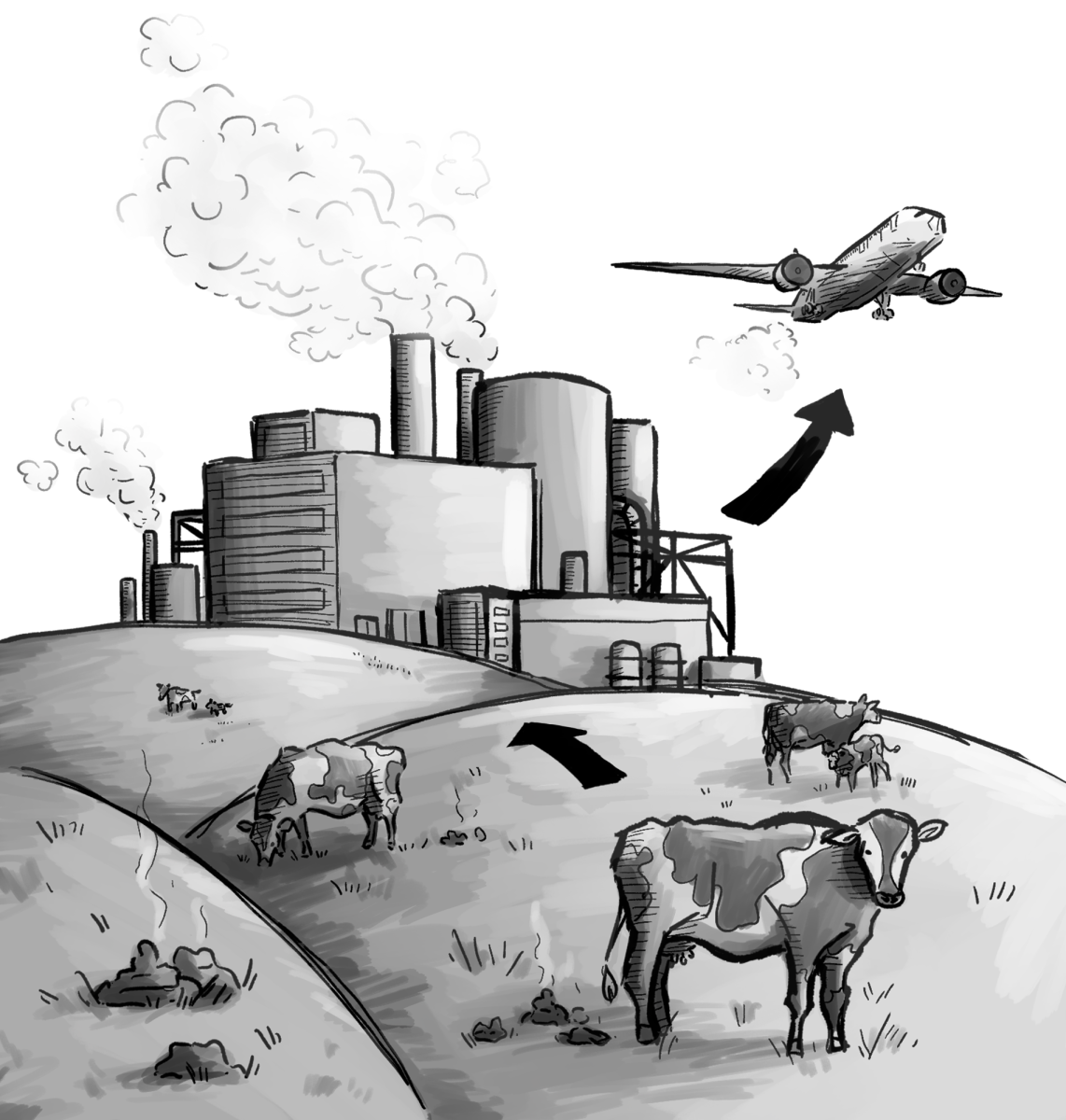
As freezing fog makes its yearly return to Walla Walla, many of us find ourselves cranking up the thermostat to stave off the frigid temperatures outside. Unfortunately, heating a house can heat the planet as well. Many homes and buildings are heated by natural gas, a fossil fuel made up mostly of methane, which is 28 times more potent than carbon dioxide at trapping heat in the atmosphere, according to the EPA. We all need to keep warm in the winter; however, this does not necessitate reliance on natural gas, as electricity continues to become a viable economic and environmental alternative. In recent years, Washington, Oregon and California have all made strides away from natural gas as a primary heating source by incentivizing or requiring new homes and businesses to install electric heat pumps.
Despite plans by West Coast states to transition away from fossil fuels in the coming decade, on Oct. 19, the Federal Energy Regulatory Commission (FERC) approved a proposal put forth by TC Energy to expand the Gas Transmission Northwest (GTN) pipeline, which runs from Alberta, Canada, through Walla Walla County and down to California. The GTN Xpress project would increase the pipeline’s current capacity of 2.9 billion cubic feet per day by 150 million through upgrades to three key compression facilities. The facilities are located in Athol, Idaho, Kent, Oregon and Starbuck, Washington, the latter being just over 30 miles from Walla Walla.
TC Energy filed its proposal with FERC in October 2021, arguing there is an increased demand for natural gas in the Pacific Northwest. In August 2022, Attorneys General from Washington, Oregon and California filed a joint motion calling for FERC to reject the project, citing major concerns with the Environmental Impact Statement and a lack of evidence of demand.
The project still received significant support from Idaho politicians. On Oct. 21, 2022, Idaho Governor Brad Little and the entirety of Idaho’s congressional delegation signed a letter in full support of the GTN Xpress Project. However, a HuffPost investigation found that the letter was ghost-written by TC Energy, the company behind the project. TC Energy was also a campaign contributor to many of the letter’s co-signers.
Three days after the letter of support was released, 37 environmental activist groups from around the Pacific Northwest, including the Washington and Oregon Sierra Club chapters, the Idaho Conservation League and Columbia Riverkeeper, signed an open letter to the governors of Washington, Oregon and California urging them to oppose the project.
In December, Oregon senators Jeff Merkley and Ron Wyden wrote a letter to FERC in opposition to the expansion. The senators stated that by FERC’s own calculations, the combination of construction activities, project operations and downstream effects would release 2.3 metric tons of carbon dioxide equivalent emissions annually for at least the next 30 years.
The letter read: “Your FEIS [Final Environmental Impact Statement] predicts the project will cause nine billion dollars in climate-related damage over the next 28 years.”
In March 2023, Washington governor Jay Inslee also wrote a letter to FERC, urging them to reject the GTN Xpress project.
“This project does not serve a public need or interest and evidence suggests it will harm consumers. Furthermore, it sharply conflicts with Washington State’s efforts to reduce greenhouse gas emissions and transition to clean energy,” the letter said.
After delaying voting for several months, FERC voted to approve the project on Oct. 19, 2023. Despite the substantial opposition, the decision was not unexpected. Between 2000 and 2021, FERC approved 423 out of the 425 pipeline proposals they received. FERC has been criticized in the past for its minimal regard for environmental concerns and inadequate research into consumer demand for new pipelines.
First-year and climate activist Nova Castles said they were unsurprised to find out FERC had approved the proposal. Though Castles and others have worked to raise awareness about the GTN Xpress project, including through a school strike, Castles acknowledged that information about the project is somewhat inaccessible to the average person.
“Half of the documentation that has relevant things in it is buried under pages and pages and pages of the internet. I spent a half hour before this call searching for the final environmental impact statement on the Federal Energy Regulatory Commission’s website and could not find it,” they said.
Additionally, Castles noted that much of the information released by TC Energy and FERC regarding the project was riddled with errors and omissions.
“The location maps on the draft statement are just wrong,” Castles said.
The project’s final environmental impact statement has also been a subject of criticism. The letter from Oregon’s U.S. Senators identified how FERC’s emissions estimate omitted a significant purchaser of the pipeline’s gas.
“FERC disregarded the downstream emissions for fossil gas subscribed to by a Canadian fossil gas producer – a third of the total subscribed gas – because FERC claims it is not ‘reasonably foreseeable’ where the fossil gas would be used,” the letter said.
Whitman’s Sustainability Manager Sarah Williams shared additional environmental concerns regarding the project.
“The expansion of the pipeline … introduces a concerning prospect of leaks and spills that could contaminate water sources and soil, leading to persistent environmental harm and health risks for nearby communities. These concerns are particularly acute in seismic-prone regions like the Pacific Northwest, where the threat of earthquakes could heighten the probability of pipeline ruptures and subsequent leaks,” she said.
Williams also acknowledged the negative effects the project could have on tribes, who are often disproportionately impacted by fossil fuel fracking and distribution.
“The pipeline’s expansion has the potential to encroach upon the rights and well-being of [I]ndigenous communities in the area, many of whom maintain deep ties to the land and rely on it for cultural and economic sustenance,” she said.
The Columbia River Inter-Tribal Fish Commission submitted comments to FERC regarding the draft environmental impact statement, stating the Commission’s strong opposition to the expansion. They also noted that they were not consulted regarding the project and its impacts, even though the federal government is legally required to work with tribes that could be impacted by oil and gas projects.
A major concern for Indigenous groups and other populations living near pipelines is the risk for leaks which can contaminate groundwater, rivers, farm land and more and can even lead to explosions and fires. Helen Yost, a climate activist and community organizer from Sandpoint, Idaho, pointed out FERC’s disregard for public health and safety.
“They don’t seem to have considered environmental injustices,” Yost said. “This is a 60-plus-year-old pipeline and they’re putting more pressure and more volume of gas through. It’s just a fiery accident waiting to happen.”
In 2011, Yost founded Wild Idaho Rising Tide, a climate activist collective that has been opposing the project for years. She referenced multiple gas leaks that have already happened on the GTN pipeline including in LaCrosse, Washington and Moyie Springs, Idaho. In addition, she cited a major oil spill from the Keystone Pipeline, owned by TC Energy, in December 2022 that released more than 500,000 gallons of oil into nearby creeks and farmland.
Since the project’s approval, Yost has organized protests throughout Washington and Idaho to call for state legislators to file a petition for a rehearing from FERC. In addition to environmental and safety concerns, Yost and others have questioned whether there is adequate demand for natural gas to justify expanding the pipeline’s capacity.
“There’s going to be a decline in demand for natural gas across the Northwest. There’s been all kinds of municipalities and counties that have instituted laws pushing for electrification of buildings,” she said.
Yost’s sentiment is supported by the West Coast Attorneys General in their joint motion to FERC.
“There is no public necessity for [the project]. State policies will significantly reduce regional demand for methane, so increasing fixed costs for methane infrastructure will harm consumers in the long term,” the motion said.
At a time when the cost of fossil fuels is increasing, and the cost of renewable energy is rapidly decreasing, a pipeline expansion seems uncalled for.
“It all just looks like a giant push by GTN and these other companies to saturate the Northwest market with natural gas that it doesn’t need, only so that it can offload and make profits from its increasingly stranded assets up in Canada,” said Yost.
Despite the disappointing outcome of the recent FERC decision, both Castles and Yost expressed the importance of continuing opposition to the project.
“If FERC doesn’t listen to the elected officials and all the citizens of the Northwest opposing this project, if it denies or it doesn’t even respond to these petitions for rehearing, there’ll be more protests. And then there’ll be more protests when construction starts too. So we encourage everyone to participate as best as they can,” said Yost.
“If there’s anything people take away from reading about a really frustrating project like this, [I hope] it’s that there are people fighting it and you can join them and you can fight this fight, because it’s winnable and I’ve seen us win parts of it,” Castles said.







Kudos • Nov 16, 2023 at 6:47 pm
Woke hits again! Fake science. Why don’t these people ever talk to someone who knows what they are talking about? Train after train of coal going to California to make electricity. Natural gas is the most efficient means of power/heat.
Earth enjoyer • Nov 17, 2023 at 3:53 pm
Actually the most efficient means of heat is a heat pump that moves heat rather than creates it… but moving on from that, there’s no proven demand for this natural gas pipeline in the Pacific Northwest. You can’t just switch a coal plant into a natural gas plant, it takes significant retrofitting or a straight-up new facility. This pipeline wouldn’t reduce the amount of coal California imports because they have to keep feeding the coal plants anyway. It’s not “woke” to question the underlying economic principles of an infrastructure project, in fact, I would argue it’s fiscally prudent!